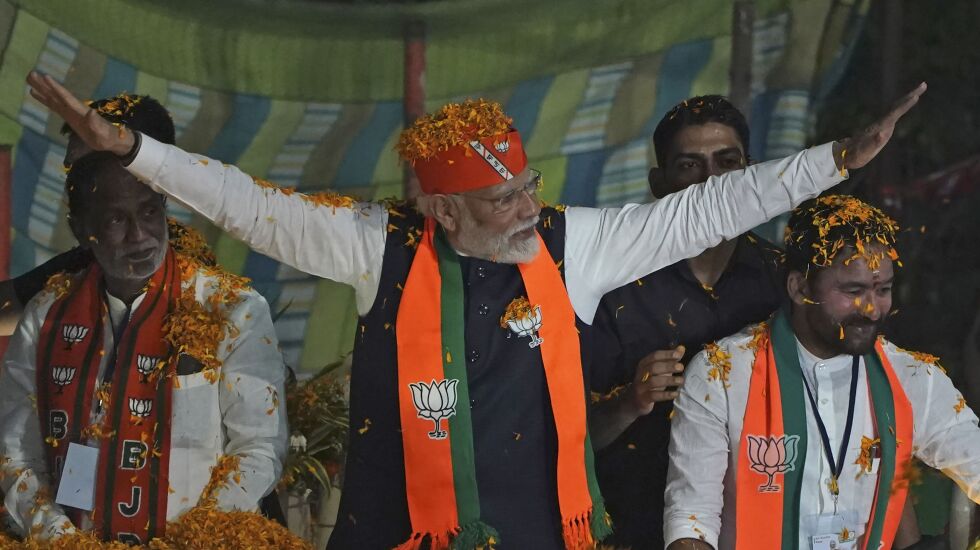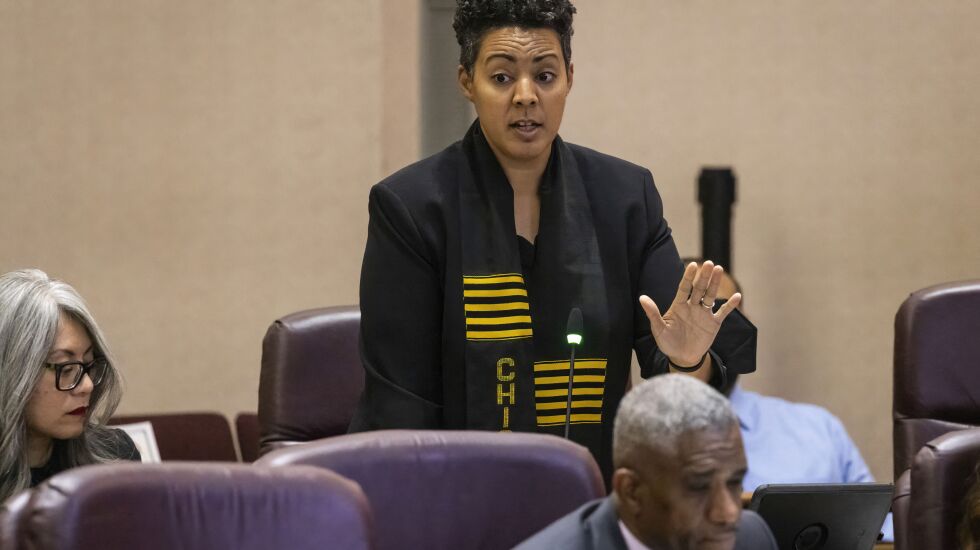
In the heart of our beautiful city of Chicago, a battle is quietly raging over Hindu nationalism. First conceived in the 20th century by Indian admirers of Hitler and Mussolini, Hindu nationalism is a divisive political project that seeks to transform India into a fundamentally Hindu state where people from other religions, particularly Muslims and Christians, are second-class citizens.
Dominating government policy in India, sparking countless acts of violence against Indian religious minorities, and animating frequent debates among Chicagoland’s 238,000 Indian Americans, Hindu nationalism — which shouldn’t be confused with Hinduism or the tenets of that faith — nonetheless remains largely unknown to many Chicagoans.
As Hindu nationalist organizations prey on the ignorance of local voters to import this bigoted ideology into this diverse city, Chicagoans can no longer afford to remain in the dark.
Chicagoland-based Hindu nationalist groups have scuttled a City Council human rights resolution; attempted but failed to insert Islamophobic language into Illinois state legislation; and invited profoundly bigoted, anti-Muslim religious leaders from India to spread their ideas in Chicagoland.
Because Indian media closely reports U.S. discussions of India’s Hindu nationalist policies and its Hindu nationalist Prime Minister, Narendra Modi, what Chicagoans say and do has global consequences.
A recent report by my organization, the Indian American Muslim Council, reveals how Hindu nationalist organizations have used local institutions to project international support for their dangerous political vision.
The report recounts a recently publicized discussion between the General Secretary of the Hindu nationalist organization, the Vishwa Hindu Parishad of America (VHPA), Amitabh Mittal, and local Hindu nationalist leader Bharat Barai.
The two men explain how they defeated Ald. Maria Hadden’s (49th) proposed pro-Indian democracy City Council resolution in 2021, a symbolic resolution that would have condemned Indian government policies that jeopardize the human rights of religious minorities and the autonomy of the state of Kashmir.

To support their campaign, the VHPA and Barai enlisted the help of former Ald. Joe Moore, who had been defeated by Hadden in the previous election, as well as the then-head of the Indian Consulate of Chicago, Amit Kumar.
The group organized protests outside of Hadden’s office, sent thousands of emails to all 50 aldermen, and organized one-on-one meetings arguing that the resolution would damage US-India relations. Then-Consulate General Kumar wrote to Mayor Lori Lightfoot, urging her to oppose the resolution.
The consulate’s participation forms part of the Indian government’s broader campaign to influence and repress foreign nationals — a trend which includes the Indian government’s alleged assassination of Canadian Sikh leader Hardeep Singh Nijjar and its assassination attempt on American citizen Gurpatwant Singh Pannun, and its censorship of overseas organizations like my own.
The joint campaign worked. Hadden’s resolution, endorsed by Amnesty International and similar to resolutions passed by Seattle and San Francisco, was defeated. It was a victory for the VHPA, an organization that shares its name and ideology with a paramilitary group (the Vishwa Hindu Parishad) listed for many years in the CIA fact-book as a “militant religious organization.” In India, Vishwa Hindu Parishad members have killed scores of Muslims because of their religion.
The Vishwa Hindu Parishad of America had also invited Sadvi Rithambara — the woman considered primarily responsible for inciting mobs to destroy one of India’s oldest and most important mosques — to speak in the Chicago suburbs. An Indian religious leader who had previously stated, “All Muslims should be eliminated” addressed VHPA’s American membership via Zoom in 2021.
This is the organization that defeated a Chicago City Council human rights resolution.
Ghosts of the KKK?
The fight to secure support for Hindu nationalism in Chicago continues in subtler forms as well. This year, the Hindu nationalist organization Hindu Swayamsevak Sangh collaborated with the Indian consulate to host a Yogathon at Navy Pier and participated in the world’s largest interfaith conference at McCormick Place (where, thankfully, the speaker backed by the organization was blocked from participating).
The Hindu Sawayamsevak Sangh draws inspiration from the anti-Muslim Indian paramilitary organization Rashtriya Swayamsevak Sangh and continues to display the portrait of the latter’s former chief, MS Golwalkar, at events. He was an ideologue who once wrote, “Germany shocked the world by her purging of the country of the Semitic races — the Jews. Race pride at its highest has been manifested here ... a good lesson for us in Hindustan to learn and profit by.”
Chicago readers might imagine the KKK opening chapters under barely altered names in India, displaying David Duke’s portrait at local gatherings and attempting to pass resolutions off on unsuspecting Indian politicians. Something exactly like this is what we now see in Chicago.
What’s more, these groups collaborate with the Chicago Indian Consulate, an office that interfaces with thousands of Indian American Muslims.
With Hindu nationalism having arrived in Chicago, our best defense is to educate ourselves about its local proponents and stand up for peaceful, interfaith communities here and in all the other countries we call home.
Rasheed Ahmed is the executive director of the Indian American Muslim Council, which is based in Morton Grove.
The Sun-Times welcomes letters to the editor and op-eds. See our guidelines.
The views and opinions expressed by contributors are their own and do not necessarily reflect those of the Chicago Sun-Times or any of its affiliates.







